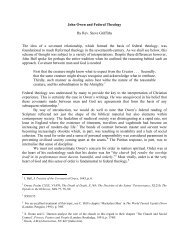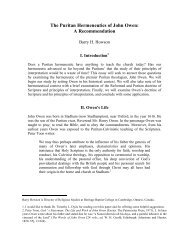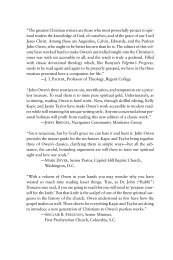M.TH. LONG DISSERTATION (LD6.1) - John Owen
M.TH. LONG DISSERTATION (LD6.1) - John Owen
M.TH. LONG DISSERTATION (LD6.1) - John Owen
You also want an ePaper? Increase the reach of your titles
YUMPU automatically turns print PDFs into web optimized ePapers that Google loves.
<strong>John</strong> <strong>Owen</strong>’s Theological Context<br />
Maker, and to be the vice-regent of the Ruler of all things.’ 220 Therefore, ‘Education 221 is<br />
implication into God’s interpretation.’ 222 There are no brute facts; they must be<br />
interpreted, and the theist will interpret them differently from the anti-theist. 223 Van Til<br />
illustrates this with reference to the fact that two times two is four, which is inevitably<br />
linked to one’s view of numerical law, and thence to all law. For non-Christians, law is<br />
independent of God, so they use ‘two times two is four’ as a way of attempting to<br />
further their escape from God. In contrast, for Christians, law is an expression of God’s<br />
will and nature; hence our numerical fact enables us ‘to implicate [ourselves] more deeply<br />
into the nature and will of God.’ 224 It is thus necessary for Christian thinkers to evaluate<br />
every ‘fact’ in relation to the triune God and his revelation. I have precommitments: that<br />
is inevitable. And these precommitments, assuming them to be correct, should shape my<br />
response to <strong>John</strong> <strong>Owen</strong>.<br />
In the context of scholarship that has been skewed by theological<br />
precommitments, Muller and Trueman’s concern is to represent their subjects accurately<br />
in their historical contexts, and to limit evaluation to that context: why, given his context,<br />
does x say this? Is it reasonable and coherent by the standards of his day, not those of a<br />
previous or later period? Thus, Muller argues that<br />
historians can only make truth claims about the world that they attempt to<br />
reconstruct in their investigations…. What the historian cannot do, without<br />
the importation of non-historical criteria to his work, is assess the truth or<br />
falsity of a theological or philosophical point or the rectitude of an ethical<br />
act. 225<br />
220 Berkhof and Van Til 1990: 44.<br />
221 Which surely includes historical research.<br />
222 Berkhof and Van Til 1990: 44.<br />
223 Berkhof and Van Til 1990: 46.<br />
224 Berkhof and Van Til 1990: 7f.<br />
225 Muller 1997: 306.<br />
66





